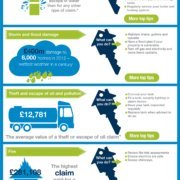 Applying to all commercial contracts of insurance and variations to existing contracts of insurance from the 12th August 2016, the Insurance Act 2015 introduces the biggest reform to insurance contract law in more than a century.
Applying to all commercial contracts of insurance and variations to existing contracts of insurance from the 12th August 2016, the Insurance Act 2015 introduces the biggest reform to insurance contract law in more than a century.
You have always had a duty to disclose all ‘Material Facts’, but the new Insurance Act changes this requirement to a ‘Fair Presentation of the Risk’, which means that, in addition to carefully answering any and all questions, you need to advise us of all the information an underwriter might need to evaluate the risks in your business and quote relevant acceptance terms and the premium.
Crucially, the Insurance Act increases the number and range of people that are ‘caught’ by this new requirement and you will need to ask, not only your Directors and Principals, but major shareholders and Senior Managers within your business to disclose criminal convictions, previous liquidations and bankruptcies, county court judgements and other adverse financial issues, as well as disclosing similar issues for the company itself that have or could in the future, affect the integrity or reputation of your business. This is called a Reasonable Search under the Act and would also include material information about your company which might be held by the company’s professional advisers, such as accountants and solicitors.
You know your business and the risks that your business faces. The underwriter does not know your business, but he is expected to have some general knowledge about the trades he writes insurance for, so you must make clear the things that he doesn’t know. This could be things specific to your business that increase the risk of a loss occurring; the processes or practices that make your business different (your USP); or your future plans for the business.
Fair Presentation of Risk also requires that you ensure sums insured, indemnity limits and any other figures, such as wageroll or profit figures are accurate and provided in good faith and, although we cannot value your property for you, we will advise you of the basis of calculation for sums insured and will, on request, give you details of external experts, such as surveyors and valuers, whom you may wish to consult.
Taking the time and effort to gather this information will enable us to assist you in preparing a presentation to insurers in a clear and accessible form. You must ask us if you don’t understand any questions asked of you, or if there is any information that we provide to you which you feel is unclear. The changes in disclosure requirements mean that there is a greater breadth & scope of information that you need to provide if we are to obtain cover to protect your business and provide you with peace of mind that you are properly covered.
There are pros and cons to the new Law, but simply put, if you tell your insurer everything they need to know and comply with the terms of your policy, then they will have to pay your claim.
Because this is a new piece of Law, as your Agent, we need to help to make you aware of the change and understand the increased disclosure requirements. That is the reason for this briefing notice, and also the reason we will read to you our disclosure script prior to providing you with an insurance quotation. It’s important that you understand your new obligations as our named contact within your business who will take on the responsibility for ensuring that your disclosure obligations are being met.
The positive side of the Insurance Act is that, if you have given the insurer all of the information required, then you should receive fairer treatment in the event of a claim.
If, despite your best efforts, something arises to suggest that the risk presentation to underwriters was not fair, as long as you were not reckless* or deliberately withheld information in the presentation, Insurers will now have to consider whether the change in information would have affected the premium, terms, or their decision whether to accept the risk.
Previously such incidents would have invariably led to the policy automatically being cancelled, even if the information was unrelated to the loss, but under the Insurance Act a range of ‘proportionate remedies’ will apply, which means;
- if they would have charged a higher premium, then your claim would be reduced
in proportion to the amount paid;
- if they would have applied different terms, then those terms will apply back to
the inception of the policy;
- if they would have refused to offer insurance, then your policy would be cancelled
and the premium refunded to you
BUT, if the non-disclosure would not have affected their decision to insure you, and the rate and terms would have remained unchanged, then your claim will be paid in full.
*Reckless means you didn’t check information when giving it, and fraudulent (deliberate) non-disclosures will still enable the insurer to, not only void the policy, but also to keep the premium you have paid, so it is important that you make sure that all material information and facts are properly and clearly disclosed.
The customer’s position is also generally improved in the event of a claim in which a totally unconnected warranty or policy condition has been breached
The position on warranties is also changed under the Act to achieve a fairer outcome and, although you must still comply with these strict conditions throughout the policy term (and advise us or the insurer if at any time you are unable to do so!), a claim would only be refused if the breach of warranty affected the risk of the loss occurring, in the circumstances in which it occurred. This is an improvement on the previous legislation which permitted insurers to void the policy for any breach of warranty.
However, breach of a warranty which IS related to the loss, such as failure to set a burglar alarm under an alarm warranty in which the burglary may have been prevented had the alarm been operating, would still mean your claim would not be paid. Under these circumstances, the cover related to the breach of warranty would be suspended so that the claim is not covered, however when the breach is remedied (i.e. the alarm is reactivated) cover would be reinstated from that point.
Insurers will also have to pay claims promptly
Another improvement is that, from May 2017, Insurers will have a legal obligation to pay claims ‘promptly’ or suffer possible damages claims. This doesn’t prevent an insurer from properly investigating a claim, but does mean that other delays should be minimised.














